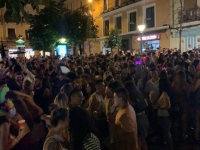Health
Covid-19 is primed with young Spaniards waiting to be vaccinated
Only 50% of the population, vaccinated
USPA NEWS -
The Spanish Government says that 50% of the country's population has already received the complete vaccination schedule against Covid-19. However, contrary to what was announced last April, when the Prime Minister, Pedro Sanchez, assured that Spain would achieve herd immunity at the end of this summer, the new date advanced by the Government is the end of the year. And that while the incidence of the coronavirus increases, the ICUs of the hospitals fill up again and the infections reappear in nursing homes, among health personnel and in vaccinated people. Although the greatest concern is young people, the sector of the population that has not yet received any vaccine and, after the lifting of restrictions, develops risk activities.
The Spanish, like, in general, all the other peoples of the Mediterranean basin, are happy and festive, used to celebrating life in the streets and meeting in groups for any reason. Sociologists point out that this character may be influenced by the long hours of sunshine enjoyed by Mediterranean countries. After almost a year and a half of confinement and restrictions, it was to be expected that, when the restrictions ended, the Spaniards would take to the streets to make up for lost time. Above all, the young.
For years, an important socio-economic phenomenon has been registered in Spain: young people under 18 years of age, who are not old enough to drink in bars and discos, buy liquors and soft drinks in the supermarkets of the cities and then meet in large groups to drink combined for little money. It is what in Spain is known as 'Botellón' and poses a major problem for municipalities because the Police are, on many occasions, powerless to prevent it.
Psychologists affirm that young people are not aware of the danger they run from not complying with the protection regulations against Covid-19. They believe that they are immune to the disease and that Covid-19 only kills the old and the sick. But the reality is different: as vaccination among the elderly and middle-aged adults progresses, infections, hospitalizations and even deaths among young people increase.
"There are more cases among young people because the coronavirus is transmitted among the population that still has no defenses against it," explains pediatrician Ángel Hernández Merino, member of the Vaccine Advisory Committee of the Spanish Association of Pediatrics, in statements to the press. This population without defenses is made up of those under 35 years of age. The Spanish health authorities have stepped up the vaccination rate for young people in recent days, without forgetting the middle-aged Spaniards who must receive the second dose or even who have not received any. But vaccination depends on the existence of available doses and that poses specific problems of supply and delays in the inoculation of vaccines to people.
To help control the pandemic, some regional governments with high numbers of infections in their territories are demanding the return of the curfew and even the selective confinement of cities or neighborhoods. The problem is the legal backing of these measures and the differences in criteria between courts make a common strategy against the coronavirus difficult. Last week, the Constitutional Court declared unconstitutional the confinement decreed by the Government of Spain in March 2020, under the declaration of the state of alarm. The High Court considers that the confinement should have been protected by the declaration of a state of emergency, since the state of alarm does not allow the reduction of fundamental rights defended by the Constitution.
The Spanish Government argues that, with the declaration of the state of alarm in March 2020 and the confinement that was decreed, thousands of lives were saved. Along the same lines, the recent lifting of restrictions is a consequence of the improvement in the health situation due to the increase in vaccination. Among the restrictions that fell is the use of the mask outdoors and provided that a distance between people of 1.5 meters can be kept, where it is no longer mandatory. This Wednesday, the Spanish Parliament must ratify the measure. Some regions such as the Basque Country and Catalonia, however, demand the mandatory use of a mask in all situations and the establishment of a curfew.
Liability for this article lies with the author, who also holds the copyright. Editorial content from USPA may be quoted on other websites as long as the quote comprises no more than 5% of the entire text, is marked as such and the source is named (via hyperlink).






